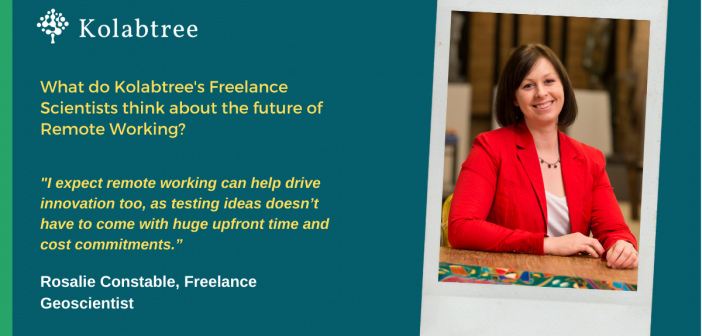With global lockdowns in full swing, remote working rapidly rising in popularity and the emergence of an expert economy in addition to the erstwhile gig economy, there has never been a greater sense of collaboration between business and academia.
With more scientists and industry experts choosing to switch to remote projects, businesses can leverage their expertise and insight to test new ideas, innovate projects and ultimately bring their products to market.
Kolabtree, for instance, houses more than 20,000 freelancers with expertise across myriad niche domains. Right from drafting regulatory documents to helping businesses position their product in the market better, our experts are specialized across the entire pipeline.
Here’s what our top freelancers have to say about the burgeoning expert economy and the future of remote working.
Rosalie Constable – Freelance Geoscientist with a PhD in Sedimentology
“I definitely think remote collaboration is here to stay. It was already starting to become more common – we regularly worked with remote consultants in my previous company – but it is now much more widely accepted and has made many people realise how much can be achieved when teams work remotely.
The lockdowns also forced a lot of companies to implement the hardware and software systems to make remote work possible, so I expect it will continue to be widely used. Speaking as a freelance geoscientist, remote collaboration suits my style of working, so I’m happy it’s more widely accepted now!
In addition to remote collaboration, the so-called “gig economy” seems to be expanding into more sectors now too. For start-ups and small businesses, platforms like Kolabtree are a great way to connect with qualified and experienced scientists who can help rapidly progress their ideas without the commitment and expense of hiring a specialist or big consultancy firm.
I expect this could help drive innovation too, as testing ideas doesn’t necessarily have to come with huge upfront time and cost commitments.”
Hugo Lisboa – Freelance Food and Biomaterials Researcher with a PhD in Material Science
“I think remote working has opened a window and people are seeing things a little bit differently now. I think the number of people with permanent remote jobs will drastically increase. People and companies are realizing that a lot of good things can come from working from home, and productivity has not been an issue for the most part.
Of course, people working in traditional roles that require office/shop visits will eventually go back to the pre-pandemic way of working, but I think people will try to work remotely wherever possible. Teaching is another area that I personally don’t think is suitable when done in a remote working capacity.
I’m teaching a postgraduate course now, and the relative lack of interaction between teachers and students in online classes compared to classroom teaching means the student really misses out. I don’t think anything can replace the classroom experience, and the students really learn a lot whilst engaging with the teachers and their fellow students.
So, I don’t think all jobs will be translated to remote working but the ones that do will solve a lot of problems. Traffic, for instance. Why sit through the hustle and bustle of traffic to rush to the office downtown when you have a good office at home that’s perfectly equipped for you to conduct all business from? This is key to saving time, leading a healthy lifestyle and ultimately establishing a better work-life balance.”
Catarina Carrao – Freelance Scientific and Medical writer with a PhD in Biochemistry
“I do think companies will be more flexible towards days-in/days-out for those workers that find home-working the best. But hierarchy runs deep in many companies, and daily interactions are appreciated by many workers that can’t really focus in a home environment. I think there will be a place for all, as long as the work output is productive.”
Victoria Ware – Freelance Science and Medical writer with a specialization in immunology
“I think it’s been a catalyst for a shift that was coming anyway. The technology exists to work remotely, and for a lot of people being able to work remotely allows them to do jobs that they might not otherwise have been able to. In that way, it’s opening doors.
I would imagine some companies will want to revert to in-office working, but I imagine that will come down to if they can show their employees are being effective remotely and also whether they are able to adequately support their employees from a distance.
I think medical writing suits remote work but I couldn’t speak for other industries where the focus is on meetings etc. Another fact is the individual. I know some people love working from home while for others it is a huge challenge, and I wouldn’t like to see home working widening inequality with those who have access to enough peace and quiet and space to work from home having an advantage over those who don’t have that privilege. It’s a balancing act.”
So, what are your thoughts on the future of remote working? Let us know by leaving a comment below. Looking for a freelance medical content writer? Post a project for free on Kolabtree or scout from our wide network of freelance experts.







